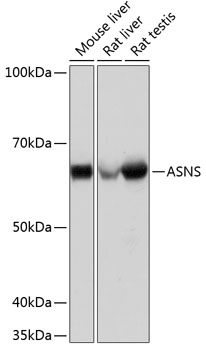Anti-ASNS Antibody (CAB1030)
- SKU:
- CAB1030
- Product type:
- Antibody
- Reactivity:
- Human
- Mouse
- Rat
- Host Species:
- Rabbit
- Isotype:
- IgG
- Antibody Type:
- Monoclonal Antibody
- Research Area:
- Metabolism
Description
| Antibody Name: | Anti-ASNS Antibody |
| Antibody SKU: | CAB1030 |
| Antibody Size: | 20uL, 50uL, 100uL |
| Application: | WB |
| Reactivity: | Human, Mouse, Rat |
| Host Species: | Rabbit |
| Immunogen: | A synthesized peptide derived from human ASNS |
| Application: | WB |
| Recommended Dilution: | WB 1:500 - 1:2000 |
| Reactivity: | Human, Mouse, Rat |
| Positive Samples: | MCF7, Mouse liver, Rat liver, Rat testis |
| Immunogen: | A synthesized peptide derived from human ASNS |
| Purification Method: | Affinity purification |
| Storage Buffer: | Store at -20°C. Avoid freeze / thaw cycles. Buffer: PBS with 0.02% sodium azide, 0.05% BSA, 50% glycerol, pH7.3. |
| Isotype: | IgG |
| Sequence: | Email for sequence |
| Gene ID: | 440 |
| Uniprot: | P08243 |
| Cellular Location: | |
| Calculated MW: | 61kDa |
| Observed MW: | 64KDa |
| Synonyms: | ASNSD, TS11 |
| Background: | The protein encoded by this gene is involved in the synthesis of asparagine. This gene complements a mutation in the temperature-sensitive hamster mutant ts11, which blocks progression through the G1 phase of the cell cycle at nonpermissive temperature. Alternatively spliced transcript variants have been described for this gene. [provided by RefSeq, May 2010] |
| UniProt Protein Function: | ASNS: 3 isoforms of the human protein are produced by alternative splicing |
| UniProt Protein Details: | Protein type:Amino Acid Metabolism - alanine, aspartate and glutamate; Cell cycle regulation; Ligase; Energy Metabolism - nitrogen; EC 6.3.5.4 Chromosomal Location of Human Ortholog: 7q21.3 Cellular Component: cytosol Molecular Function:protein homodimerization activity; asparagine synthase (glutamine-hydrolyzing) activity; cofactor binding; ATP binding Biological Process: response to light stimulus; unfolded protein response; response to toxin; glutamine metabolic process; liver development; positive regulation of mitotic cell cycle; response to amino acid stimulus; cellular response to hormone stimulus; cellular response to glucose starvation; cellular protein metabolic process; unfolded protein response, activation of signaling protein activity; asparagine biosynthetic process; response to mechanical stimulus; response to methotrexate; amino acid biosynthetic process; response to follicle-stimulating hormone stimulus; negative regulation of apoptosis Disease: Asparagine Synthetase Deficiency |
| NCBI Summary: | The protein encoded by this gene is involved in the synthesis of asparagine. This gene complements a mutation in the temperature-sensitive hamster mutant ts11, which blocks progression through the G1 phase of the cell cycle at nonpermissive temperature. Alternatively spliced transcript variants have been described for this gene. [provided by RefSeq, May 2010] |
| UniProt Code: | P08243 |
| NCBI GenInfo Identifier: | 13432102 |
| NCBI Gene ID: | 440 |
| NCBI Accession: | P08243.4 |
| UniProt Secondary Accession: | P08243,P08184, Q15666, Q549T9, Q96HD0, A4D1I8, B4DXZ1 B7ZAA9, D6W5R3, E9PCI3, E9PCX6, |
| UniProt Related Accession: | P08243 |
| Molecular Weight: | 561 |
| NCBI Full Name: | Asparagine synthetase |
| NCBI Synonym Full Names: | asparagine synthetase (glutamine-hydrolyzing) |
| NCBI Official Symbol: | ASNS |
| NCBI Official Synonym Symbols: | TS11; ASNSD |
| NCBI Protein Information: | asparagine synthetase [glutamine-hydrolyzing]; asparagine synthetase [glutamine-hydrolyzing]; TS11 cell cycle control protein; glutamine-dependent asparagine synthetase |
| UniProt Protein Name: | Asparagine synthetase [glutamine-hydrolyzing] |
| UniProt Synonym Protein Names: | Cell cycle control protein TS11; Glutamine-dependent asparagine synthetase |
| Protein Family: | Asparagine--tRNA ligase |
| UniProt Gene Name: | ASNS |
| UniProt Entry Name: | ASNS_HUMAN |





